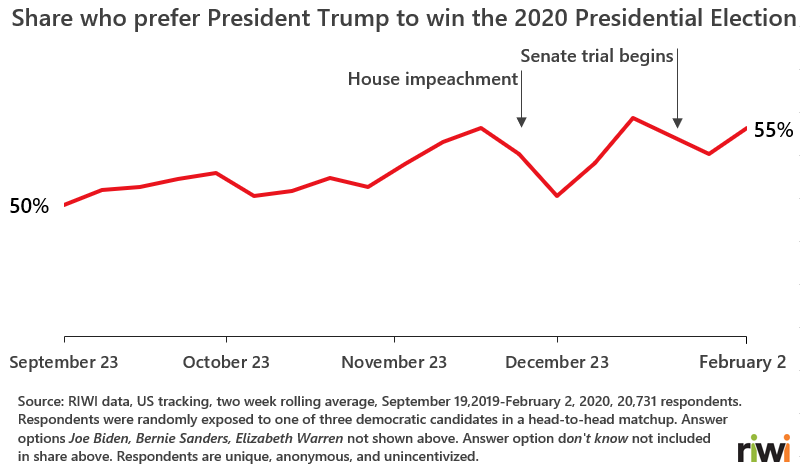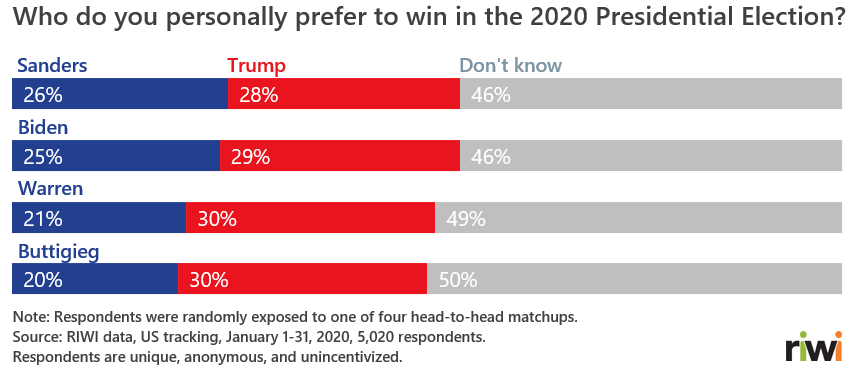By: Emily Kuzan
Support for President Trump remains high

This month RIWI data show sustained, increased support for President Trump through the Senate impeachment trial, with support climbing to 55 percent – five percent higher than his standing in RIWI data four months prior. We randomly exposed respondents to three head-to-head matchups1 (against Former Vice President Biden, Senator Sanders, and Senator Warren), consolidated the results and excluded don’t know responses to find what share of respondents would prefer President Trump to win re-election in 2020.
The data show a similar increase in support across all geographic regions (Midwest, Northeast, South, West), with support in January up to 54% in the Midwest, a crucial swing region.
At the national level the election is still wide open, say RIWI crowd predictors
| Regardless of whom you support, which party do you think will win your state in the 2020 Presidential election? | ||
| Democratic Party | Republican Party | Don’t know |
| 24% | 25% | 51% |
| Source: RIWI data, US tracking, January 1-31, 2020, 6,413 respondents. Respondents are unique, anonymous, and unincentivized. |
||
- Both academic and previous RIWI predictions show that asking who respondents think will win is more predictive than tallying individual preferences
- The Republican party pulls ahead among those who believe it is worth their time to vote; 36% of likely voters believe the Republican party will win in the state, 34% believe the Democratic party will, while 30% don’t know
President Trump wins in every head-to-head matchup
This month Senator Sanders overtook former Vice President Biden as the leading Democratic candidate in our head-to-head matchups. However, we continue to see that no Democratic candidate gains a higher share of votes than President Trump in a face-off.

About 2020 In-Focus: RIWI Predictive Election Tracker
RIWI’s election tracker is different than traditional methods because it:
- Uses RIWI-powered technology that accurately predicted the 2016 Presidential Election
- It is continuous and real-time
- It reflects both engaged and politically disengaged populations, in contrast to traditional polls which typically capture engaged, often paid, populations
- It reflects views anonymously, reducing social desirability bias
- It uses unincentivized respondents who are not on a ‘panel’ of habitual survey takers, receive no money or rewards-in-kind for participating in the survey, thus ensuring data quality, anonymity and compliance with privacy law.
Two of the “X-factors” that caused conventional polls to miss the 2016 election and that could manifest again in 2020 were 1) the underreflection of typically disengaged populations including those in the Midwest and 2) the “shy Trump voter” effect2. The RIWI patented methodology and technology platform addresses both X-factors.
From October 2019 to the November 2020 election, expect monthly updates on which party Americans think will win the Presidential Election, who Americans personally prefer to win the Presidential Election, and a new monthly insight depending on what the data reveal.
- Mayor Buttigieg was added to the head-to-head matchups in December following increased media attention; we exclude the data from his matchup in this trend line to ensure the data are consistent over time.
- Russonello, G. (2019, November 23). Four Problems With 2016 Trump Polling That Could Play Out Again in 2020. The New York Times. Retrieved from https://www.nytimes.com/2019/11/23/us/politics/2020-trump-presidential-polls.html
